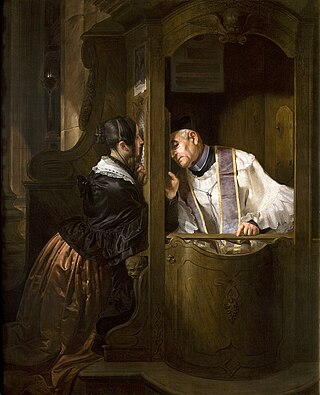
An abbess is the female superior of a community of nuns in an abbey.

Confession, in many religions, is the acknowledgment of sinful thoughts and actions. This may occur directly to a deity or to fellow people.

Penance is any act or a set of actions done out of repentance for sins committed, as well as an alternate name for the Catholic, Lutheran, Eastern Orthodox, and Oriental Orthodox sacrament of Reconciliation or Confession. It also plays a part in confession among Anglicans and Methodists, in which it is a rite, as well as among other Protestants.
An ecclesiastical court, also called court Christian or court spiritual, is any of certain courts having jurisdiction mainly in spiritual or religious matters. In the Middle Ages, these courts had much wider powers in many areas of Europe than before the development of nation states. They were experts in interpreting canon law, a basis of which was the Corpus Juris Civilis of Justinian, which is considered the source of the civil law legal tradition.
In a number of Christian traditions, including Orthodoxy, Catholicism, Lutheranism, and Anglicanism, a confessor is a priest who hears the confessions of penitents and pronounces absolution.

Absolution is a theological term for the forgiveness imparted by ordained Christian priests and experienced by Christian penitents. It is a universal feature of the historic churches of Christendom, although the theology and the practice of absolution vary between Christian denominations.
In the Catholic Church, the Seal of Confession is the absolute duty of priests or anyone who happens to hear a confession not to disclose anything that they learn from penitents during the course of the Sacrament of Penance (confession). Even where the seal of confession does not strictly apply – where there is no specific serious sin confessed for the purpose of receiving absolution – priests have a serious obligation not to cause scandal by the way they speak.

A penitential is a book or set of church rules concerning the Christian sacrament of penance, a "new manner of reconciliation with God" that was first developed by Celtic monks in Ireland in the sixth century AD. It consisted of a list of sins and the appropriate penances prescribed for them, and served as a type of manual for confessors.
Validity and liceity are concepts in the Catholic Church. Validity designates an action which produces the effects intended; an action which does not produce the effects intended is considered "invalid". Liceity designates an action which has been performed legitimately; an action which has not been performed legitimately is considered "illicit". Some actions can be illicit, but still be valid.
Latae sententiae and ferendae sententiae are ways sentences are imposed in the Catholic Church in its canon law.
In keeping with its prevailing self-identity as a via media or "middle path" of Western Christianity, Anglican sacramental theology expresses elements in keeping with its status as a church in the catholic tradition and a church of the Reformation. With respect to sacramental theology the Catholic tradition is perhaps most strongly asserted in the importance Anglicanism places on the sacraments as a means of grace, sanctification and forgiveness as expressed in the church's liturgy.
The Sacrament of Penance is one of the seven sacraments of the Catholic Church, in which the faithful are absolved from sins committed after baptism and reconciled with the Christian community. During reconciliation mortal sins must be confessed and venial sins may be confessed for devotional reasons. According to the dogma and unchanging practice of the church, only those ordained as priests may grant absolution.

In the Catholic Church, a bishop is an ordained minister who holds the fullness of the sacrament of holy orders and is responsible for teaching doctrine, governing Catholics in his jurisdiction, sanctifying the world and representing the Church. Catholics trace the origins of the office of bishop to the apostles, who it is believed were endowed with a special charism and office by the Holy Spirit at Pentecost. Catholics believe this special charism and office has been transmitted through an unbroken succession of bishops by the laying on of hands in the sacrament of holy orders.
Reserved cases or reserved sins is a term of Catholic doctrine, used for sins whose absolution is not within the power of every confessor, but is reserved to himself by the superior of the confessor, or only specially granted to some other confessor by that superior.
The canonical situation of the Society of Saint Pius X (SSPX), a group founded in 1970 by Archbishop Marcel Lefebvre, is unresolved. The Society of Saint Pius X has been the subject of much controversy since 1988, when Bernard Fellay, Bernard Tissier de Mallerais, Richard Williamson and Alfonso de Galarreta were illicitly consecrated at Ecône, at the International Seminary of Saint Pius X as bishops in violation of canon law. Lefebvre and the four other SSPX bishops individually incurred a disciplinary latae sententiae excommunication for the schismatic act; the excommunications of the four living SSPX bishops were remitted in 2009.
This is a glossary of terms used within the Catholic Church. Some terms used in everyday English have a different meaning in the context of the Catholic faith, including brother, confession, confirmation, exemption, faithful, father, ordinary, religious, sister, venerable, and vow.
In the canon law of the Catholic Church, excommunication is a form of censure. In the formal sense of the term, excommunication includes being barred not only from the sacraments but also from the fellowship of Christian baptism. The principal and severest censure, excommunication presupposes guilt; and being the most serious penalty that the Catholic Church can inflict, it supposes a grave offense. The excommunicated person is considered by Catholic ecclesiastical authority as an exile from the Church, for a time at least.

There are seven sacraments of the Catholic Church, which according to Catholic theology were instituted by Jesus Christ and entrusted to the Church. Sacraments are visible rites seen as signs and efficacious channels of the grace of God to all those who receive them with the proper disposition.
A censure, in the canon law of the Catholic Church, is a medicinal and spiritual punishment imposed by the church on a baptized, delinquent, and contumacious person, by which he is deprived, either wholly or in part, of the use of certain spiritual goods until he recovers from his contumacy. These goods can encompass access to the sacraments, participation in certain liturgical activities, and involvement in ecclesiastical functions.







